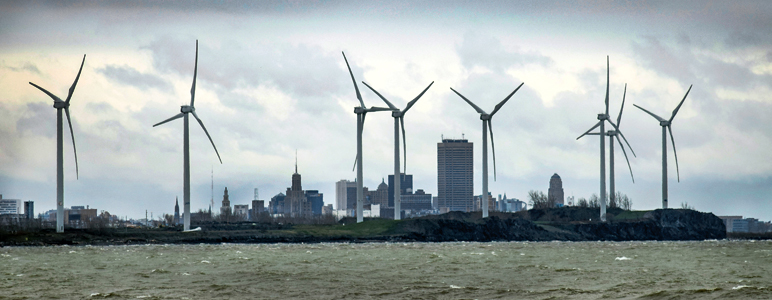


While California leads the U.S. clean energy transformation toward decarbonization, seven Northeastern states—New York, Massachusetts, Connecticut, New Hampshire, Vermont, Rhode Island and Maine—when combined, rival the Golden State in renewable energy deployment, energy efficiency (EE) and electric vehicle (EV) adoption. In fact, according to the American Council for an Energy Efficient Economy (ACEEE), Massachusetts has been ranked the No. 1 state in energy efficiency nationwide for eight consecutive years, beating California in this category each year. Why?
When you put the state numbers together, the Northeast is greener than you might think (definitely more than I thought before moving to Massachusetts from California two years ago). Right behind Massachusetts and California in the 2018 ACEEE State Energy Efficiency Scorecard is Rhode Island (No. 3), Vermont (No. 4), Connecticut (No. 5) and New York (No. 6). This is mostly due to Northeast states spending more money per capita on EE and state transit than California. As noted in the ACEEE scorecard, “A state’s investment in public transit is a key indicator of its interest in promoting energy-efficient modes of transportation.”
Read related CSE News, CSE and Stony Brook University Announce Collaboration for Clean Energy Development
Northeast successes
The Northeast states have a history of working together toward common goals—and have done so in building EE, transportation electrification and electric sector decarbonization through the Regional Greenhouse Gas Initiative (RGGI).
RGGI is a program that creates a cap-and-invest market for carbon emissions from power plants in nine member states. RGGI states have reduced carbon dioxide (CO2) significantly since 2005, while the region’s per capita GDP has continued to grow. Since its first auction in 2008, RGGI has generated more than $2.6 billion of revenue and contributed to CO2 emissions from electricity generating facilities dropping by nearly 40% during 2009-17.
In 2018, Massachusetts also established a first-of-its-kind Clean Peak Energy Standard to incentivize the utilization of clean energy during times of peak demand when the grid is most strained and emits the most greenhouse gasses (GHGs).
Regionally, the Transportation Climate Initiative (TCI) builds on the multistate collaboration that led to the establishment of RGGI and looks to tackle the more than one-third of GHG emissions that come from the region’s transportation sector. TCI is a collaboration of 12 Northeast and mid-Atlantic states, of which nine have agreed to develop a comprehensive cap-and-invest system by the end of 2019.
In addition, 10 Northeastern and mid-Atlantic states have chosen, under section 177 of the federal Clean Air Act, to follow California’s vehicle emissions standards. It is these standards that require an increasing percentage of new vehicles sold to be zero-emission vehicles (ZEVs). In 2013, nine states, seven from the Northeast and mid-Atlantic and California and Oregon signed an agreement to build a robust market for ZEVs.
Legislators and regulators in Northeastern states have opened the doors to clean energy programs, despite the lack of current federal leadership. This year, New York Governor Andrew Cuomo announced new initiatives he is referring to as the “Green New Deal” with the following goals:
- Increasing New York’s Clean Energy Standard to 100% clean energy by 2040
- Nearly quadrupling New York’s offshore wind target to 9,000 megawatts by 2035
- Deploying 3,000 megawatts of energy storage by 2030
- Doubling solar deployment to 6,000 megawatts by 2025
It is also no coincidence that the Green New Deal that Congress is debating has original sponsors from the Northeast states of New York (U.S. Representative Alexandria Ocasio-Cortez) and Massachusetts (U.S. Senator Ed Markey). Of the 91 current sponsors in the House, after California, the largest number of co-sponsors hail from New York, Massachusetts and Connecticut. Of the 12 co-sponsors in the Senate, seven are from the Northeast and mid-Atlantic region.
CSE in the Northeast
Bold and rapid actions are needed to reduce fossil fuel use and slash GHG emissions. With this focus, the CSE Northeast team is working as a transparent, independent partner to decarbonize the built environment and transportation sectors through efforts in the region to achieve greater sustainable energy deployment and higher EE goals.
For example, CSE recently signed a research agreement with Stony Brook University on Long Island, N.Y., that establishes a strategic partnership with their Advanced Energy Research and Technology Center to serve as a catalyst for designing and developing programs and technologies to help transform the clean energy market through the electrification of buildings and transportation.
The opportunity to reduce emissions in the Northeast building sector is aided by the availability of cold climate heat pumps, advanced wood heat and the use of biofuels in place of oil in existing heating equipment. CSE is focusing on these technologies as a primary path to reduce emissions and consumer costs.
We’re also demonstrating how energy storage technologies can help flatten the electricity load as it shifts over time due to increased EVs, heat pumps and behind-the-meter solar. Increasing our ability to shift loads and dispatch stored energy during peak demand periods is critical to achieving a decarbonized future, where the primary energy sources will be more variable and intermittent.
To decarbonize transportation, CSE is working with regional partners to administer EV incentive programs and develop climate-smart pathways that connect EV charging stations in a ubiquitous electric charging infrastructure network to support widespread EV deployment.
CSE’s CA experience
In California, CSE has developed best practices for designing and implementing renewable energy and clean transportation programs that drive the marketplace and consumer adoption—and we are working to bring this experience to the Northeast. One example, after many years of administering general market and low-income programs for the California Solar Initiative that ended in 2016, we pushed for a collaborative approach to managing California’s new Solar on Multifamily Affordable Housing (SOMAH) program—and won the contract.
The California Public Utilities Commission created SOMAH to provide up to $100 million annually for 10 years to help reach state climate goals by funding solar energy installations on multifamily housing serving low-income and disadvantaged communities, with the direct financial benefits for residents.
Instead of going it alone, CSE joined with other leading not-for-profit clean energy and affordable housing organizations to form a community-minded and values-driven administrative team. We believe this approach will deliver the maximum possible benefit for the tenants and communities it is designed to serve, by ensuring that every program component is delivered effectively, efficiently and with a mission-led and values-based approach. We effectively turned potential competitors into collaborators with complementary strengths and a strong public benefit lens.
Partner with us
CSE is now established in the Northeast with offices in Boston, Brooklyn and Stony Brook, increasing our ability to serve government agencies, utilities, businesses and residents as they plan and achieve higher sustainable energy and efficiency goals.
If you share our commitment to accelerate the just transition to a sustainable world powered by clean energy, we welcome a conversation to learn and explore how we might collaborate and develop policies and programs that provide greater benefit for the region’s residents through accelerated decarbonization.

